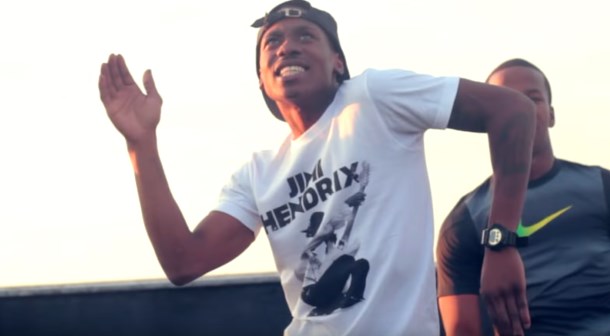Epic seeks dismissal of 2 Milly's Fortnite lawsuit
The studio said that the rapper's 'dance step' cannot be copyrighted, and it's not the same as 'Swipe It' anyway.

Rapper 2 Milly led the lawsuit charge against Epic Games over its use of real-world dance moves in Fortnite, filing a copyright infringement action in December 2018 that accused the studio of using his Milly Rock dance in the game without credit or compensation. Now Epic has fired back with a request to dismiss the suit, saying that "no one can own a dance step," and that Fortnite's "Swipe It" emote isn't a direct copy of Milly Rock anyway.
"Plaintiff’s lawsuit is fundamentally at odds with free speech principles as it attempts to impose liability, and thereby chill creative expression, by claiming rights that do not exist under the law. No one can own a dance step. Copyright law is clear that individual dance steps and simple dance routines are not protected by copyright, but rather are building blocks of free expression, which are in the public domain for choreographers, dancers, and the general public to use, perform, and enjoy," Epic states in its response, available via the Hollywood Reporter.

What's new with the latest Fortnite season
The best Fortnite creative codes
The optimal Fortnite settings
Our favorite Fortnite skins
The best Fortnite toys
"Yet, each of Plaintiff’s claims is based on his assertion that he has a monopoly on a side step with accompanying swinging arm movement that is then repeated on the other side (the 'Dance Step'), and thus can prevent others from using it. Specifically, he argues that the Dance Step appeared in Epic Games’ massive, complex battle royale video game, Fortnite, as the 'Swipe It' emote (one of hundreds of tiny customizations allowing players’ avatars to celebrate on the battlefield). To be clear, he does not claim that Fortnite’s avatars resemble him or that any other parts of the fanciful game infringe his rights."
Epic said the suit should be dismissed because 2 Milly "cannot establish substantial similarity between his alleged work and Fortnite." The Milly Rock "Dance Step" and Swipe It look an awful lot alike, it is true, but Epic argues that copyright "does not protect individual dance steps or simple dance routines," which is how it views the 'Dance Step': Not as a whole work, but as one of the "building blocks of expression" that make up the game.
"The Dance Step is just such an unprotectable idea as Ninth Circuit courts have held in similar situations involving movements, choreography, and poses," Epic wrote. "As the Dance Step is not protectable, there is nothing to compare to Fortnite, and the works necessarily are not substantially similar."
It makes similar legal arguments against 2 Milly's non-copyright-based claims: They "involved the same Dance Step and seek to address the same copying as Plaintiff's copyright claims and, thus, they are preempted by the Copyright Act and should be dismissed for this reason alone." His right of publicity and unfair competition and trademark claims are also barred by by First Amendment protections.
Interestingly, Epic also took pains to break down how Milly Rock and Swipe it are actually not all that similar at all, and it really is quite something to see the two moves compared in the driest possible legal terms.
The biggest gaming news, reviews and hardware deals
Keep up to date with the most important stories and the best deals, as picked by the PC Gamer team.
"The Dance Step consists of a side step to the right while swinging the left arm horizontally across the chest to the right, and the reversing the same movement on the other side," Epic's response states. "By contrast … Swipe It consists of (1) varying arm movements, sometimes using a straight, horizontal arc across the chest, and other times starting below the hips and then traveling in a diagonal arc across the body, up to the shoulder, while pivoting side to side on the balls and heels of the feet, (2) a wind up of the right arm before swiping, and (3) a rolling motion of the hands and forearms between swipes."
"Moreover, whereas the torso, shoulders, and head face forward while the ribs move side-to-side in the Dance Step, the torso, shoulders, and head turn to the side while the ribs remain in place in Swipe It. The Dance Step is also performed at a significantly quicker tempo than Swipe It. Finally, whereas Plaintiff uses the Dance Step while listening and dancing to music with his friends, Swipe It's role in Fortnite is to allow players to express themselves on the battlefield. These differences are particularly pronounced given how short the Dance Step and Swipe It are. The works simply are not substantially similar."
Epic is seeking to have the case dismissed with prejudice, meaning that 2 Milly would not be able to file another claim on the same matter in the future. One way or another, the outcome could have a significant impact on the other cases that have been filed against Epic over Fortnite emotes—and on the use of similar content in other games.

Andy has been gaming on PCs from the very beginning, starting as a youngster with text adventures and primitive action games on a cassette-based TRS80. From there he graduated to the glory days of Sierra Online adventures and Microprose sims, ran a local BBS, learned how to build PCs, and developed a longstanding love of RPGs, immersive sims, and shooters. He began writing videogame news in 2007 for The Escapist and somehow managed to avoid getting fired until 2014, when he joined the storied ranks of PC Gamer. He covers all aspects of the industry, from new game announcements and patch notes to legal disputes, Twitch beefs, esports, and Henry Cavill. Lots of Henry Cavill.

